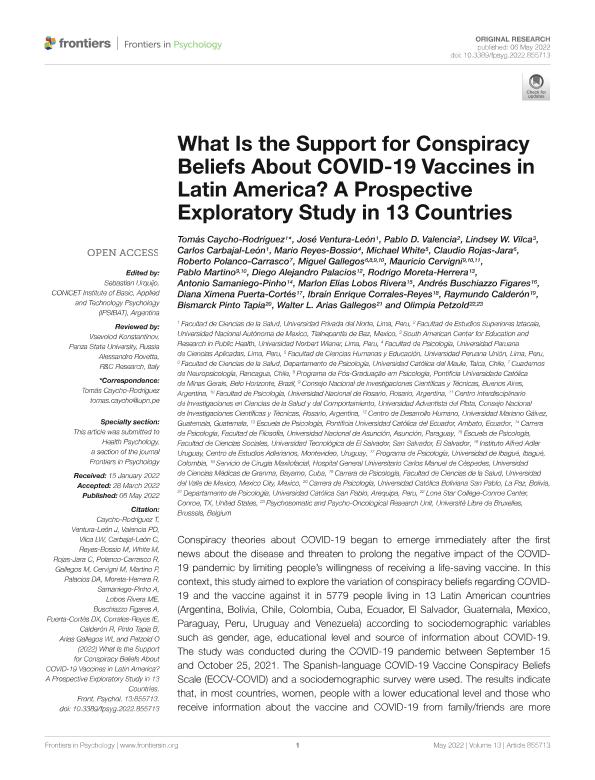Artículo
What Is the Support for Conspiracy Beliefs About COVID-19 Vaccines in Latin America? A Prospective Exploratory Study in 13 Countries
Caycho Rodríguez, Tomás; Ventura León, José; Valencia, Pablo D.; Vilca, Lindsey W.; Carbajal León, Carlos; Reyes Bossio, Mario; White, Michael; Rojas Jara, Claudio; Polanco Carrasco, Roberto; Gallegos de San Vicente, Miguel Omar ; Cervigni, Mauricio Alejandro
; Cervigni, Mauricio Alejandro ; Martino, Pablo Luis
; Martino, Pablo Luis ; Palacios, Diego Alejandro; Moreta Herrera, Rodrigo; Samaniego Pinho, Antonio; Lobos Rivera, Marlon Elías; Buschiazzo Figares, Andrés; Puerta Cortés, Diana Ximena; Corrales Reyes, Ibraín Enrique; Calderón, Raymundo; Pinto Tapia, Bismarck; Arias Gallegos, Walter L.; Petzold, Olimpia
; Palacios, Diego Alejandro; Moreta Herrera, Rodrigo; Samaniego Pinho, Antonio; Lobos Rivera, Marlon Elías; Buschiazzo Figares, Andrés; Puerta Cortés, Diana Ximena; Corrales Reyes, Ibraín Enrique; Calderón, Raymundo; Pinto Tapia, Bismarck; Arias Gallegos, Walter L.; Petzold, Olimpia
 ; Cervigni, Mauricio Alejandro
; Cervigni, Mauricio Alejandro ; Martino, Pablo Luis
; Martino, Pablo Luis ; Palacios, Diego Alejandro; Moreta Herrera, Rodrigo; Samaniego Pinho, Antonio; Lobos Rivera, Marlon Elías; Buschiazzo Figares, Andrés; Puerta Cortés, Diana Ximena; Corrales Reyes, Ibraín Enrique; Calderón, Raymundo; Pinto Tapia, Bismarck; Arias Gallegos, Walter L.; Petzold, Olimpia
; Palacios, Diego Alejandro; Moreta Herrera, Rodrigo; Samaniego Pinho, Antonio; Lobos Rivera, Marlon Elías; Buschiazzo Figares, Andrés; Puerta Cortés, Diana Ximena; Corrales Reyes, Ibraín Enrique; Calderón, Raymundo; Pinto Tapia, Bismarck; Arias Gallegos, Walter L.; Petzold, Olimpia
Fecha de publicación:
05/2022
Editorial:
Frontiers Media
Revista:
Frontiers in Psychology
e-ISSN:
1664-1078
Idioma:
Inglés
Tipo de recurso:
Artículo publicado
Clasificación temática:
Resumen
Conspiracy theories about COVID-19 began to emerge immediately after the first news about the disease and threaten to prolong the negative impact of the COVID-19 pandemic by limiting people’s willingness of receiving a life-saving vaccine. In this context, this study aimed to explore the variation of conspiracy beliefs regarding COVID-19 and the vaccine against it in 5779 people living in 13 Latin American countries (Argentina, Bolivia, Chile, Colombia, Cuba, Ecuador, El Salvador, Guatemala, Mexico, Paraguay, Peru, Uruguay and Venezuela) according to sociodemographic variables such as gender, age, educational level and source of information about COVID-19. The study was conducted during the COVID-19 pandemic between September 15 and October 25, 2021. The Spanish-language COVID-19 Vaccine Conspiracy Beliefs Scale (ECCV-COVID) and a sociodemographic survey were used. The results indicate that, in most countries, women, people with a lower educational level and those who receive information about the vaccine and COVID-19 from family/friends are more supportive of conspiracy ideas regarding the COVID-19 vaccine. In the case of age, the results vary by country. The analysis of the responses to each of the questions of the ECCV-COVID reveals that, in general, the countries evaluated are mostly in some degree of disagreement or indecision regarding conspiratorial beliefs about COVID-19 vaccines. The findings could help open further study which could support prevention and treatment efforts during the COVID-19 pandemic.
Palabras clave:
BELIEFS
,
CONSPIRACY
,
COVID-19
,
LATIN AMERICA
,
VACCINE
Archivos asociados
Licencia
Identificadores
Colecciones
Articulos(IRICE)
Articulos de INST.ROSARIO DE INVEST.EN CS.DE LA EDUC. (I)
Articulos de INST.ROSARIO DE INVEST.EN CS.DE LA EDUC. (I)
Citación
Caycho Rodríguez, Tomás; Ventura León, José; Valencia, Pablo D.; Vilca, Lindsey W.; Carbajal León, Carlos; et al.; What Is the Support for Conspiracy Beliefs About COVID-19 Vaccines in Latin America? A Prospective Exploratory Study in 13 Countries; Frontiers Media; Frontiers in Psychology; 13; 855713; 5-2022; 1-18
Compartir
Altmétricas



